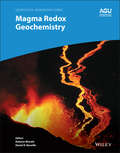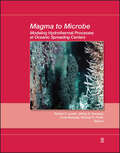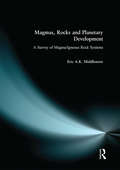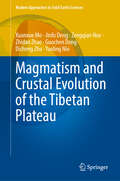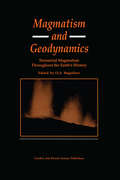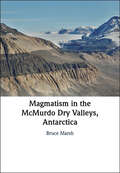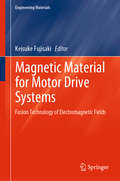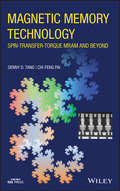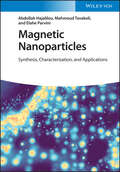- Table View
- List View
Magma Redox Geochemistry (Geophysical Monograph Series)
by Roberto Moretti Daniel R. NeuvilleMagma Redox Geochemistry Magma Redox Geochemistry The redox state is one of the master variables behind the Earth’s forming processes, which at depth concern magma as the major transport agent. Understanding redox exchanges in magmas is pivotal for reconstructing the history and compositional make-up of our planet, for exploring its mineral resources, and for monitoring and forecasting volcanic activity. Magma Redox Geochemistry describes the multiple facets of redox reactions in the magmatic realm and presents experimental results, theoretical approaches, and unconventional and novel techniques. Volume highlights include: Redox state and oxygen fugacity: so close, so farRedox processes from Earth’s accretion to global geodynamicsRedox evolution from the magma source to volcanic emissionsRedox characterization of elements and their isotopes The American Geophysical Union promotes discovery in Earth and space science for the benefit of humanity. Its publications disseminate scientific knowledge and provide resources for researchers, students, and professionals.
Magma to Microbe: Modeling Hydrothermal Processes at Oceanic Spreading Centers, 1st Edition
by Robert P. Lowell Jeffrey S. Seewald Anna Metaxas Michael R. PerfitPublished by the American Geophysical Union as part of the Geophysical Monograph Series, Volume 178. Hydrothermal systems at oceanic spreading centers reflect the complex interactions among transport, cooling and crystallization of magma, fluid circulation in the crust, tectonic processes, water-rock interaction, and the utilization of hydrothermal fluids as a metabolic energy source by microbial and macro-biological ecosystems. The development of mathematical and numerical models that address these complex linkages is a fundamental part the RIDGE 2000 program that attempts to quantify and model the transfer of heat and chemicals from "mantle to microbes" at oceanic ridges. This volume presents the first "state of the art" picture of model development in this context. The most outstanding feature of this volume is its emphasis on mathematical and numerical modeling of a broad array of hydrothermal processes associated with oceanic spreading centers. By examining the state of model development in one volume, both cross-fertilization of ideas and integration across the disparate disciplines that study seafloor hydrothermal systems is facilitated. Students and scientists with an interest in oceanic spreading centers in general and more specifically in ridge hydrothermal processes will find this volume to be an up-to-date and indispensable resource.
Magmas, Rocks and Planetary Development: A Survey of Magma/Igneous Rock Systems
by Eric A. MiddlemostThe variety of volcanic activity in the Solar System is widely recognised, yet the majestic sequences of magmatic processes that operate within an active planet are much less well known. Providing an exposition of igneous rocks, magmas and volcanic erupsions, this book brings together magnetic and volcanic data from different tectonic settings, and planets, with explanations of how they fit together. It systematically examines composition, origin and evolution of common igneous rocks, yet also examines a variety of rare magnetic rocks that play a crucial role in the global magma/igneous rock system.
Magmatism and Crustal Evolution of the Tibetan Plateau (Modern Approaches in Solid Earth Sciences #25)
by Zengqian Hou Xuanxue Mo Jinfu Deng Zhidan Zhao Guochen Dong Dicheng Zhu Yaoling NiuThis book presents a comprehensive coverage of the magmatic and crustal evolution of the Tibetan Plateau through time, based mainly on the recent data and observations of the authors. It provides extensive geochemical, isotopic and geochronological datasets to better constrain the geodynamic evolution of the highest and thickest orogenic plateau in the world. It is a unique and original contribution to our understanding of the geology and landscape of the “roof of the world” in an integrated and multi-disciplinary approach. All chapters in the book are process-oriented and data-rich, and reflect the most recent knowledge and information on the Tibetan Plateau. All five authors of the book have worked extensively in Tibet and in the adjacent areas over the years. Their familiarity with both the geology of Tibet and all the research done there by different scientific teams during the last 30 years are a major driving force behind this book.
Magmatism and Geodynamics: Terrestrail Magmatism Throughout the Earth's History
by O. A. BogatikovMagnatism is the only true endogenic process for generating new material on the Earth's surface. Obviously, magmatism and tectonic movements are reflections of geodynamics, that is, physical processes which occur in deep-seated environments. What are the interrelationships between magmatism and tectronics? How did the character of terrestrial magmatism change through time and are there any irregularities in this process?
Magmatism in the McMurdo Dry Valleys, Antarctica
by Bruce MarshThe mechanisms of magma movement, chemical differentiation and physical development, are derived from the geochemistry of igneous rocks, and from studying exposures of deep magmatic systems that have since solidified and been uplifted and exposed at the Earth's surface. The Ferrar Magmatic System of the McMurdo Dry Valleys in Antarctica provides an unparalleled example of a complete magmatic-volcanic system exposed in unprecedented detail. This book provides a unique and usual three-dimensional detailed examination of this system, providing insight into many magmatic processes normally unobservable, in particular how basaltic magma moves upwards through the crust, how it entrains, carries and deposits loads of crystals from great depths, and how this all contributes to Earth's evolution. Providing an explanation of how magmatic systems operate and how igneous rocks form, this is an invaluable resource ideal for researchers and graduate students in magma physics, igneous petrology, volcanology, and geochemistry.
Magnetic Actuators and Sensors
by John R. BrauerA fully updated, easy-to-read guide on magnetic actuators and sensors The Second Edition of this must-have book for today's engineers includes the latest updates and advances in the field of magnetic actuators and sensors. Magnetic Actuators and Sensors emphasizes computer-aided design techniques—especially magnetic finite element analysis; offers many new sections on topics ranging from magnetic separators to spin valve sensors; and features numerous worked calculations, illustrations, and real-life applications. To aid readers in building solid, fundamental, theoretical background and design know-how, the book provides in-depth coverage in four parts: PART I: MAGNETICS Introduction Basic Electromagnetics Reluctance Method Finite-Element Method Magnetic Force Other Magnetic Performance Parameters PART II: ACTUATORS Magnetic Actuators Operated by Direct Current Magnetic Actuators Operated by Alternating Current Magnetic Actuator Transient Operation PART III: SENSORS Hall Effect and Magnetoresistive Sensors Other Magnetic Sensors PART IV: SYSTEMS Coil Design and Temperature Calculations Electromagnetic Compatibility Electromechanical Finite Elements Electromechanical Analysis Using Systems Models Coupled Electrohydraulic Analysis Using Systems Models With access to a support website containing downloadable software data files (including MATLAB® data files) for verifying design techniques and analytical methods, Magnetic Actuators and Sensors, Second Edition is an exemplary learning tool for practicing engineers and engineering students involved in the design and application of magnetic actuators and sensors.
Magnetic Cloud Boundary Layers and Magnetic Reconnection
by Yi WangThis thesis focuses on magnetic reconnection processes in the boundary layer of the interplanetary magnetic cloud. Magnetic reconnection is an important and frontier topic in the realm of physics. Various physical phenomena can be observed during the reconnection process but lots of them are not fully understood. This thesis provides the first observational evidence of energetic electrons associated with magnetic reconnection in the solar wind and discusses the particle acceleration problems. In addition, after analyzing the particle flux variations in Magnetic Cloud Boundary Layer, the thesis proposes a possible new criterion for the identification of magnetic reconnection in the solar wind. These tantalizing results could be particular clues to understand the dynamical problems in magnetic reconnection processes.
Magnetic Dynamics in Antiferromagnetically-Coupled Ferrimagnets: The Role of Angular Momentum (Springer Theses)
by Takaya OkunoThis book presents the theoretical and experimental investigations on antiferromagnetically coupled ferrimagnets and reveals new aspects of ferrimagnetic dynamics in terms of the role of angular momentum. The purpose of this book is to show readers that antiferromagnets/ferrimagnets are useful in spintronic devices in that (1) The nonadiabatic spintransfer torque in antiferromagnets acts as a staggered magnetic field, which can drive the magnetic domain walls, and (2) The Gilbert damping parameter α, the energy dissipation rate associated with the magnetic dynamics of ferrimagnets, is insensitive to temperature in contrast to the conventional understanding that the effective α of ferrimagnets diverges at the angular momentum compensation temperature. This book provides readers with a scientific platform of ferrimagnetic dynamics, which serves as a useful basis for realizing the next generation of spintronic devices.
Magnetic Field Effects in Low-Dimensional Quantum Magnets (Springer Theses)
by Adam IaizziThis thesis is a tour-de-force combination of analytic and computational results clarifying and resolving important questions about the nature of quantum phase transitions in one- and two-dimensional magnetic systems. The author presents a comprehensive study of a low-dimensional spin-half quantum antiferromagnet (the J-Q model) in the presence of a magnetic field in both one and two dimensions, demonstrating the causes of metamagnetism in such systems and providing direct evidence of fractionalized excitations near the deconfined quantum critical point. In addition to describing significant new research results, this thesis also provides the non-expert with a clear understanding of the nature and importance of computational physics and its role in condensed matter physics as well as the nature of phase transitions, both classical and quantum. It also contains an elegant and detailed but accessible summary of the methods used in the thesis—exact diagonalization, Monte Carlo, quantum Monte Carlo and the stochastic series expansion—that will serve as a valuable pedagogical introduction to students beginning in this field.
Magnetic Fields in Diffuse Media
by Alexander Lazarian Elisabete M. de Gouveia Dal Pino Claudio MelioliThis volume presents the current knowledge of magnetic fields in diffuse astrophysical media. Starting with an overview of 21st century instrumentation to observe astrophysical magnetic fields, the chapters cover observational techniques, origin of magnetic fields, magnetic turbulence, basic processes in magnetized fluids, the role of magnetic fields for cosmic rays, in the interstellar medium and for star formation. Written by a group of leading experts the book represents an excellent overview of the field. Nonspecialists will find sufficient background to enter the field and be able to appreciate the state of the art.
Magnetic Fields in the Solar System: Planets, Moons and Solar Wind Interactions (Astrophysics and Space Science Library #448)
by Hermann Lühr Johannes Wicht Stuart A. Gilder Matthias HolschneiderThis book addresses and reviews many of the still little understood questions related to the processes underlying planetary magnetic fields and their interaction with the solar wind. With focus on research carried out within the German Priority Program "PlanetMag", it also provides an overview of the most recent research in the field. Magnetic fields play an important role in making a planet habitable by protecting the environment from the solar wind. Without the geomagnetic field, for example, life on Earth as we know it would not be possible. And results from recent space missions to Mars and Venus strongly indicate that planetary magnetic fields play a vital role in preventing atmospheric erosion by the solar wind. However, very little is known about the underlying interaction between the solar wind and a planet's magnetic field. The book takes a synergistic interdisciplinary approach that combines newly developed tools for data acquisition and analysis, computer simulations of planetary interiors and dynamos, models of solar wind interaction, measurement of ancient terrestrial rocks and meteorites, and laboratory investigations.
Magnetic Fusion Technology
by Thomas J. DolanMagnetic Fusion Technology describes the technologies that are required for successful development of nuclear fusion power plants using strong magnetic fields. These technologies include: * magnet systems, * plasma heating systems, * control systems, * energy conversion systems, * advanced materials development, * vacuum systems, * cryogenic systems, * plasma diagnostics, * safety systems, and * power plant design studies. Magnetic Fusion Technology will be useful to students and to specialists working in energy research.
Magnetic Levitation
by Hyung-Suk Han Dong-Sung KimThis book provides a comprehensive overview of magnetic levitation(Maglev) technologies, from fundamental principles through to thestate-of-the-art, and describes applications both realised and underdevelopment. It includes a history of Maglev science and technology showing thevarious milestones in its advancement. The core concepts, operating principlesand main challenges of Maglev applications attempted across various fields areintroduced and discussed. The principle difficulties encountered when applyingMaglev technology to different systems, namely air gap control andstabilization, are addressed in detail. The book describes howmajor advancements in linear motor and magnet technologies have enabledthe development of the linear-motor-powered Maglev train, which has a highspeed advantage over conventional wheeled trains and has the potential to reachspeed levels achieved by aircraft. However, many expect that Maglevtechnology to be a green technology that is applied not only in rail transportation,but also in diverse other fields; to ensure clean transfer in LCDmanufacturing, in ropeless high speed elevators, small capacity railtransportation, space vehicle launchers, missile testers, energy storage, andso on. These potential applications and their unique challenges and proposedtechnological solutions are introduced and discussed in depth. The book will provide readers from academia, research institutes andindustry with insights on where and how to apply Maglev technology, and willserve as a guide to the realization of their Maglev applications.
Magnetic Material for Motor Drive Systems: Fusion Technology of Electromagnetic Fields (Engineering Materials)
by Keisuke FujisakiThis book focuses on how to use magnetic material usefully for electrical motor drive system, especially electrical vehicles and power electronics. The contents have been selected in such a way that engineers in other fields might find some of the ideas difficult to grasp, but they can easily acquire a general or basic understanding of related concepts if they acquire even a rudimentary understanding of the selected contents.The cutting-edge technologies of magnetism are also explained. From the fundamental theory of magnetism to material, equipment, and applications, readers can understand the underlying concepts. Therefore, a new electric vehicle from the point of view of magnetic materials or a new magnetic material from the point of a view of electric vehicles can be envisioned: that is, magnetic material for motor drive systems based on fusion technology of an electromagnetic field. Magnetic material alone does not make up an electric vehicle, of course. Other components such as mechanical structure material, semiconductors, fuel cells, and electrically conductive material are important, and they are difficult to achieve. However, magnetic material involves one of the most important key technologies, and there are high expectations for its use in the future. It will be the future standard for motor-drive system researchers and of magneticmaterial researchers as well. This book is a first step in that direction.
Magnetic Materials
by Nicola A. SpaldinMagnetic Materials is an excellent introduction to the basics of magnetism, magnetic materials and their applications in modern device technologies. Retaining the concise style of the original, this edition has been thoroughly revised to address significant developments in the field, including the improved understanding of basic magnetic phenomena, new classes of materials, and changes to device paradigms. With homework problems, solutions to selected problems and a detailed list of references, Magnetic Materials continues to be the ideal book for a one-semester course and as a self-study guide for researchers new to the field. New to this edition: , Acents Entirely new chapters on Exchange Bias Coupling, Multiferroic and Magnetoelectric Materials, Magnetic Insulators, Acents Revised throughout, with substantial updates to the chapters on Magnetic Recording and Magnetic Semiconductors, incorporating the latest advances in the field, Acents New example problems with work
Magnetic Measurement Techniques for Materials Characterization
by Victorino Franco Brad DodrillThis book discusses the most commonly used techniques for characterizing magnetic material properties and their applications. It provides a comprehensive and easily digestible collection and review of magnetic measurement techniques. It also examines the underlying operating principles and techniques of magnetic measurements, and presents current examples where such measurements and properties are relevant. Given the pervasive nature of magnetic materials in everyday life, this book is a vital resource for both professionals and students wishing to deepen their understanding of the subject.
Magnetic Memory Technology: Spin-transfer-Torque MRAM and Beyond
by Denny D. Tang Chi-Feng PaiSTAY UP TO DATE ON THE STATE OF MRAM TECHNOLOGY AND ITS APPLICATIONS WITH THIS COMPREHENSIVE RESOURCE Magnetic Memory Technology: Spin-Transfer-Torque MRAM and Beyond delivers a combination of foundational and advanced treatments of the subjects necessary for students and professionals to fully understand MRAM and other non-volatile memories, like PCM, and ReRAM. The authors offer readers a thorough introduction to the fundamentals of magnetism and electron spin, as well as a comprehensive analysis of the physics of magnetic tunnel junction (MTJ) devices as it relates to memory applications. This book explores MRAM's unique ability to provide memory without requiring the atoms inside the device to move when switching states. The resulting power savings and reliability are what give MRAM its extraordinary potential. The authors describe the current state of academic research in MRAM technology, which focuses on the reduction of the amount of energy needed to reorient magnetization. Among other topics, readers will benefit from the book's discussions of: An introduction to basic electromagnetism, including the fundamentals of magnetic force and other concepts An thorough description of magnetism and magnetic materials, including the classification and properties of magnetic thin film properties and their material preparation and characterization A comprehensive description of Giant magnetoresistance (GMR) and tunneling magnetoresistance (TMR) devices and their equivalent electrical model Spin current and spin dynamics, including the properties of spin current, the Ordinary Hall Effect, the Anomalous Hall Effect, and the spin Hall effect Different categories of magnetic random-access memory, including field-write mode MRAM, Spin-Torque-Transfer (STT) MRAM, Spin-Orbit Torque (SOT) MRAM, and others Perfect for senior undergraduate and graduate students studying electrical engineering, similar programs, or courses on topics like spintronics, Magnetic Memory Technology: Spin-Transfer-Torque MRAM and Beyond also belongs on the bookshelves of engineers and other professionals involved in the design, development, and manufacture of MRAM technologies.
Magnetic Microhydrodynamics: An Emerging Research Field (Topics in Applied Physics #120)
by Bernard Doudin Michael Coey Andrejs CēbersThis open access book presents the most recent advances in the novel, interdisciplinary field of magnetic microhydrodynamics. This emerging area of advanced research combines magnetism with the knowledge of bioinspired local flow control to create novel concepts and technological solutions that could revolutionize the field of microfluidics. Edited and authored by world-recognized leaders in this field, this book covers how the action of magnetic forces on soft matter can result in a richness of possible static and dynamic behavior. The contributions featured in this book introduce timely examples of novel concepts (new fluids and control), processes at interfaces (local probes, electrochemistry), and applications of magnetic soft matter in cell biology, cargo transport, and energy. This book is of great interest to scientists from various backgrounds looking to explore, learn of recent developments, and take part in laying the foundations of an entirely new and dynamic field of research.
Magnetic Microscopy of Layered Structures
by Peter Fischer Wolfgang Kuch Rudolf Schäfer Franz Ulrich HillebrechtThis book presents the important analytical technique of magnetic microscopy. This method is applied to analyze layered structures with high resolution. This book presents a number of layer-resolving magnetic imaging techniques that have evolved recently. Many exciting new developments in magnetism rely on the ability to independently control the magnetization in two or more magnetic layers in micro- or nanostructures. This in turn requires techniques with the appropriate spatial resolution and magnetic sensitivity. The book begins with an introductory overview, explains then the principles of the various techniques and gives guidance to their use. Selected examples demonstrate the specific strengths of each method. Thus the book is a valuable resource for all scientists and practitioners investigating and applying magnetic layered structures.
Magnetic Monopole Noise (Springer Theses)
by Ritika DusadThis thesis presents the first ever measurement of the noise emitted by magnetic monopoles and the development of an exquisitely sensitive magnetic-field-noise spectrometer based on a superconducting quantum interference device (SQUID) that enabled it. Magnetic monopoles are highly elusive elementary particles exhibiting quantized magnetic charge. The prospects for studying them brightened recently with the theoretical discovery that the thermally excited states in certain classes of magnetic insulators exhibit all the characteristics of magnetic monopoles. Furthermore, in 2018, it was predicted that the random motion of magnetic monopoles inside would generate a very specific kind of magnetization noise. In this thesis, the author describes a new experimental technique, so-called spin noise spectroscopy, and the subsequent discovery of virtually all of the predicted features of the magnetic noise expected from a dense fluid of magnetic monopoles in crystals of Dy2Ti2O7. Remarkably, because this magnetic monopole noise occurs in the frequency range below 20kHz, when amplified by the SQUID it is actually audible to humans.
Magnetic Nanoparticles: Synthesis, Characterization, and Applications
by Abdollah Hajalilou Mahmoud Tavakoli Elahe ParviniMagnetic Nanoparticles Learn how to make and use magnetic nanoparticles in energy research, electrical engineering, and medicine In Magnetic Nanoparticles: Synthesis, Characterization, and Applications, a team of distinguished engineers and chemists delivers an insightful overview of magnetic materials with a focus on nano-sized particles. The book reviews the foundational concepts of magnetism before moving on to the synthesis of various magnetic nanoparticles and the functionalization of nanoparticles that enables their use in specific applications. The authors also highlight characterization techniques and the characteristics of nanostructured magnetic materials, like superconducting quantum interference device (SQUID) magnetometry. Advanced applications of magnetic nanoparticles in energy research, engineering, and medicine are also discussed, and explicit derivations and explanations in non-technical language help readers from diverse backgrounds understand the concepts contained within. Readers will also find: A thorough introduction to magnetic materials, including the theory and fundamentals of magnetization In-depth explorations of the types and characteristics of soft and hard magnetic materials Comprehensive discussions of the synthesis of nanostructured magnetic materials, including the importance of various preparation methods Expansive treatments of the surface modification of magnetic nanoparticles, including the technical resources employed in the process Perfect for materials scientists, applied physicists, and measurement and control engineers, Magnetic Nanoparticles: Synthesis, Characterization, and Applications will also earn a place in the libraries of inorganic chemists.
Magnetic Oxides
by Gerald F. DionneMagnetic Oxides offers a cohesive up-to-date introduction to magnetism in oxides. Emphasizing the physics and chemistry of local molecular interactions essential to the magnetic design of small structures and thin films, this volume provides a detailed view of the building blocks for new magnetic oxide materials already advancing research and development of nano-scale technologies. Clearly written in a well-organized structure, readers will find a detailed description of the properties of magnetic oxides through the prism of local interactions as an alternative to collective electron concepts that are more applicable to metals and semiconductors. Researchers will find Magnetic Oxides a valuable reference.
Magnetic Properties of Metals: A Supplement to Landolt-Börnstein III/32 Series
by Yoshiyuki Kawazoe Ryunosuke NoteThe subject of this volume is to present both the numerical and graphical data on the magnetic and electrical properties of magnetic metallic multilayers which are composed with stacking up of double layers of thin films, one layer of which is at least the magnetic layer of 3d metals (M) or rare earth ones (R). Furthermore the data of the trilayers which have a top layer and bottom one of magnetic elements are also presented.
Magnetic Properties of Paramagnetic Compounds, Magnetic Susceptibility Data, Volume 1: A Supplement to Landolt-Börnstein II/31 Series
by P. Pardasani R.T. PardasaniWith the objective to collate the enormous amount of information on magnetic susceptibility parameters of a very large number of a variety of skeletons and present it in a form that can readily be retrieved and used, a new pattern is being introduced with the present volume keeping in view that now a majority of research groups look at the scientific data electronically. In this volume, magnetic properties of Y, La, Ti, Zr, V, Cr, Mo, W, Mn, Re, and Fe complexes are described. All the magnetic properties of each individual substance are listed as a single document which is self-explainable and allowing search in respect of substance name, synonyms, common vocabulary, and even structure.
